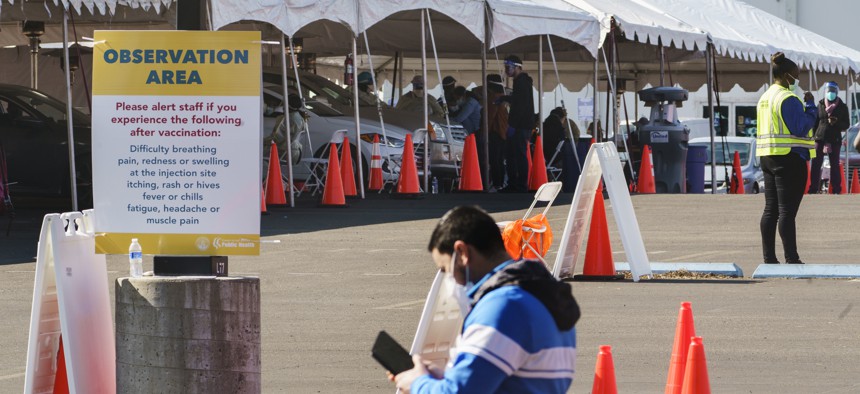‘Vaccine Tourism’ Leads to Tighter Eligibility Checks

Health workers at an "Observation Area" wait for motorists being inoculated with a COVID-19 vaccine at the mass vaccination site at the parking lot of L.A. County Office of Education headquarters in Downey, Calif., Wednesday, Feb. 3, 2021. AP Photo/Damian Dovarganes

Connecting state and local government leaders
States’ rollout of the coronavirus vaccine has been uneven, and left some people searching for appointments across state lines. Health officials say it’s a problem given scarce resources.
Clark County, Indiana’s health department provides coronavirus vaccines to people ages 65 and older. But across the river, in neighboring Louisville, Kentucky, residents must be at least 70 years old to be eligible for a vaccine.
Differences in eligibility requirements like this are just one reason why local health officials say people have been crossing state lines to get vaccinated, in the hope they get a shot more quickly than in their hometown. The so-called vaccine tourism has prompted some states and public health departments to more strictly enforce residency requirements at local vaccination sites.
“We really want to get the vaccine out to everybody as quick as possible, but our distribution is population-based so we really have to gate-keep it for our citizens,” said Dr. Eric Yazel, Clark County’s health officer.
The county’s health department issued a stern warning to would-be vaccine seekers last month, urging people to wait their turn and not to lie about factors that would make them eligible.
“At the vaccination sites we are seeing a substantial lack of morality. People are lying about their residence, lying about their job location or duties, and yes, even lying about their age as they hand us their driver’s license,” the health department said in a Facebook post. “STOP. Just STOP. If you are taking a vaccine away from a person, or an area that you were not ‘counted’ in, someone else is unable to get vaccinated.”
Since then, the Clark County Health Department has taken measures to better enforce residency and eligibility requirements, checking the addresses or birth dates on driver’s licenses, or asking people who work in the county to bring pay stubs that validate their employment, Yazel said.
“We don’t want to be known as the bar that doesn’t card people, but we aren’t trying to be obnoxious about it either,” he said.
About 34 million Americans, or 1 in 10 people in the United States, have received at least one dose of the vaccine, according to the U.S. Centers for Disease Control and Prevention. But the limited vaccine supply has created tensions among states as they work to inoculate residents.
Florida tightened eligibility requirements last month in a bid to cut down on a rash of vaccine tourism, with the state’s surgeon general signing an order that prioritizes state residents and requires proof of residency. Seasonal residents of the Sunshine State can also be vaccinated there, but they must provide proof of temporary residency through documents such as a rental agreement or utility bill.
As of Feb. 10, more than 63,000 people who had received vaccines in Florida were listed as non-residents, according to the state’s vaccine database.
The problem with vaccine tourism is twofold, according to medical experts.
If non-residents receive coronavirus vaccines and return home, the data that states collect on vaccine rates could overestimate the percentage of residents who are vaccinated “and give us a false sense of security," Dr. Tom Unnasch, a professor at the University of South Florida, told WTSP-TV.
States are also allotted vaccines based on their populations. So if out-of-towners receive the vaccine, states could run short on doses for their residents.
In Clark County, where the health department receives about 600 doses a week, roughly four or five people have been turned away from vaccine sites each day for not meeting eligibility requirements, Yazel said. When people are turned away, it slows down the process, he said.
“The sooner we get all of our metro area vaccinated, the better for everyone,” Yazel said of the greater Louisville region in Kentucky and Southern Indiana.
The dynamics of vaccine tourism could shift—and become more of a problem—as states progress through eligibility tiers, Yazel said. For instance, Kentucky is expected to offer the vaccine to teachers before Indiana, setting up a scenario where Indiana educators might try to go to Kentucky to be vaccinated, he said.
Last month, Kentucky Gov. Andy Beshear announced that the state would begin enforcing a residency requirement for vaccines.
"We're just trying to make sure that everybody goes where they're supposed to, and we don't end up with too little for Kentuckians because of vaccinating individuals whose vaccine is sent to a different state," Beshear said.
Kentucky officials told the Clark County Health Department that they would only vaccinate school employees who are included on staff lists from local schools, Yazel said. He’s tried to push that information out to Clark County residents so they know they won’t be eligible and won’t waste their time making the trip.
Andrea Noble is a staff correspondent with Route Fifty.

NEXT STORY: Texas Launches Multimillion Dollar Campaign to Combat Vaccine Hesitancy




